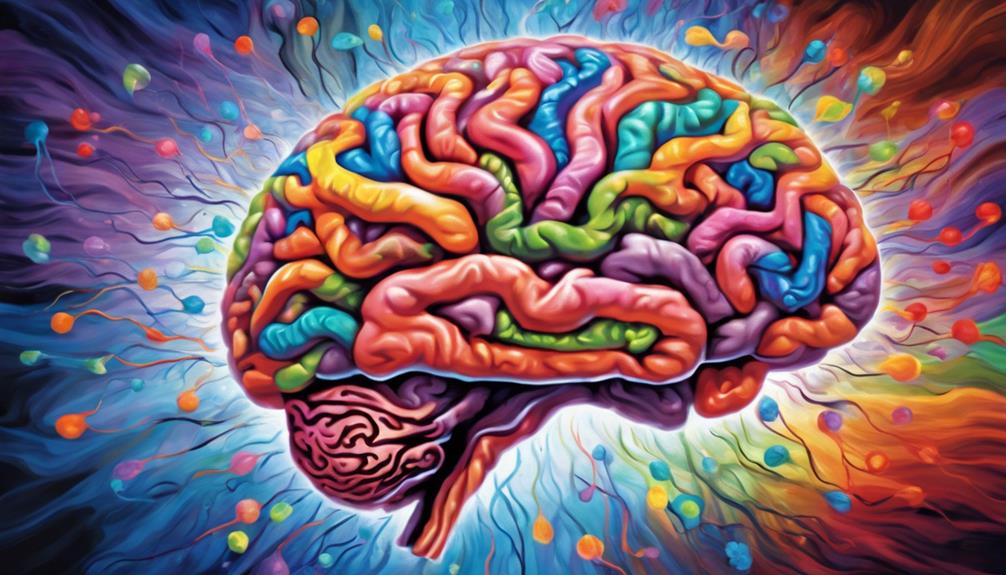Are you aware that research shows music therapy could potentially decrease agitation in dementia patients by as much as 50%?
This remarkable therapy offers a window into music’s profound impact on those with dementia.
By tapping into the intrinsic power of music, individuals with dementia often experience a range of benefits that go beyond what traditional interventions can achieve.
Whether it’s unlocking memories, improving mood, or fostering connections, music therapy holds the key to unlocking a world of possibilities for those navigating the challenges of dementia.
Key Takeaways
- Music therapy reduces dementia patient agitation by up to 50%.
- Music triggers vivid memories and soothes agitation.
- Enhances mood, fosters social bonding, and improves cognitive function.
- Uplifts spirits, promotes connection, and fosters emotional expression.
Benefits of Music Therapy for Dementia
Our experience with music therapy in dementia care has shown remarkable benefits in enhancing the physical, mental, and emotional well-being of individuals facing cognitive challenges. Music therapy plays a vital role in maintaining cognitive function and quality of life for those with Alzheimer’s disease or other forms of dementia. Through music, individuals experiencing memory loss can often recall past memories, reducing agitation and promoting a sense of calm. Moreover, music therapy fosters social bonding, creating opportunities for connection and emotional expression.
One fascinating aspect is how music impacts the motor center of the brain, even in late-stage dementia. This responsiveness highlights the profound effect music therapy can have on memory and cognitive function. By engaging with music, individuals with dementia can experience moments of joy and improved cognitive abilities, ultimately enhancing their overall well-being. Music therapy serves as a powerful tool in managing cognitive decline, offering a source of comfort and promoting a sense of connection and engagement in those facing the challenges of dementia.
Impact on Emotional Well-being

In exploring the impact of music therapy on emotional well-being for individuals with dementia, we witness a transformative journey of enhanced mood and reduced emotional distress. Music therapy has a profound effect on dementia patients, providing a pathway for them to express their emotions and engage socially through the power of personalized music interventions. By evoking positive emotions and improving mood, music therapy acts as a soothing balm for emotional distress and agitation commonly experienced by individuals with dementia. Through music interventions, these individuals can find solace, relaxation, and a renewed sense of emotional well-being.
The personalized nature of music therapy allows for emotional connections to be triggered, leading to a cascade of benefits that extend beyond the sessions. Music not only improves the emotional response of dementia patients but also helps in stimulating memories and creating moments of joy and comfort. Ultimately, music therapy serves as a holistic approach to enhancing the emotional well-being of individuals with dementia, offering them a pathway to navigate their emotions and memories with grace and positivity.
Stimulating Memories Through Music
Stimulating memories through music opens a doorway to the past for individuals with dementia, unlocking a treasure trove of emotions and connections. Music therapy has a profound impact on dementia patients, triggering strong emotional responses and vivid memories. By creating a customized playlist filled with familiar songs, we can help evoke memories that may have seemed lost. Favorite childhood tunes have the power to bring back happy memories and stimulate cognitive functions, enhancing the quality of life for those we care for.
Music interacts with the brain’s motor center, aiding in memory recall even in late-stage dementia. This stimulation not only evokes lost memories but also soothes agitation and encourages social bonding among dementia patients. Through the magic of music therapy, we can witness the transformative effects it has on memory stimulation and overall well-being. Let’s continue to harness the power of music to create meaningful connections and enrich the lives of those we serve.
Enhancing Cognitive Function

As we explore the realm of enhancing cognitive function, we uncover the transformative power of music therapy in nurturing and preserving precious memories for individuals with dementia. Music therapy offers a unique approach to improving cognitive functions in Alzheimer’s disease patients, with active music interventions proving particularly beneficial. Here are key points to consider:
- Active Music Interventions: Personalized songs and classical music selections, including compositions by Bach, Beethoven, and Mozart, have shown to enhance cognitive functions effectively.
- Brain Recovery: Music therapy induces plastic changes in brain networks, aiding in brain recovery and cognitive improvement.
- Social Communication: Through music therapy, individuals with Alzheimer’s disease can improve social communication skills, fostering connections with others.
- Classical Music Benefits: Listening to classical music has been linked to cognitive function enhancement, offering a therapeutic avenue for those with dementia.
Promoting Connection and Joy
Promoting a sense of connection and joy through music therapy is a heartfelt endeavor that uplifts the spirits of individuals with dementia, fostering emotional expression and creating moments of shared happiness. Music has a unique way of transcending the barriers that dementia erects, allowing for social connection and emotional release. In the realm of dementia care, where communication can often be challenging, music serves as a universal language that speaks to the soul. Through carefully curated music therapy sessions, individuals with dementia can experience a renewed sense of well-being and joy as they engage with melodies that evoke memories and soothe agitation.
Moreover, caregivers play a vital role in facilitating these musical experiences, acting as conduits for shared moments of happiness and connection. By actively participating in music therapy sessions alongside their loved ones, caregivers can enhance the quality of life for those with dementia, triggering memory recall and fostering a sense of belonging. Together, through the power of music, we can create a harmonious environment that promotes social bonding, emotional expression, and ultimately, moments of pure joy.
Frequently Asked Questions
What Is the Power of Music Therapy for Dementia Patients?
Music therapy for dementia patients harnesses the profound ability of music to stimulate emotions and memories. It helps ease frustration, anxiety, and stress, fostering social connections and emotional expression.
Even in advanced stages of dementia, music therapy remains a powerful tool for enhancing physical, mental, and emotional well-being. The brain’s responsiveness to music, especially in late-stage dementia, highlights the transformative impact of music therapy on individuals’ quality of life during cognitive decline.
How Is Music Therapy Keys to Dementia Care?
Music therapy is pivotal in dementia care as it unlocks emotional memories, reduces agitation, and fosters social connections.
Through personalized playlists and engaging activities, it triggers profound responses, aids in memory retention, and provides cognitive stimulation.
This therapeutic approach effectively manages frustration and anxiety by calming individuals and redirecting their focus.
Even in advanced stages, the brain’s responsiveness to music highlights its crucial role in enhancing the quality of life for those with dementia.
What Are 3 Things to Never Do With Your Loved One With Dementia?
When caring for a loved one with dementia, it is important to remember certain key principles.
We must avoid arguing with them, as it can cause frustration. Rushing or pressuring them should also be refrained from, as it can lead to stress.
It’s crucial not to dismiss their emotions, as validation and empathy are vital for their well-being.
These practices help create a supportive environment for those with dementia, promoting their comfort and peace of mind.
What Is the Number One Trigger for Dementia Behavior?
When it comes to triggering dementia behavior, the number one factor is often changes in routine or environment. These alterations can cause confusion and distress in individuals with dementia, leading to behavioral challenges.
It’s crucial to maintain familiar surroundings and consistent schedules to help minimize these triggers. By creating a stable and comforting environment, we can support those with dementia in feeling more secure and at ease, ultimately reducing the likelihood of challenging behaviors. Additionally, engaging with individuals using a calm and soothing tone can further promote a sense of safety. The concept of “talk vs touch in dementia” also plays a significant role; understanding when verbal communication is more effective than physical interaction can help prevent feelings of frustration or agitation. By being mindful of these strategies, caregivers can better respond to the unique needs of those living with dementia.
Conclusion
As we wrap up our exploration of the power of music therapy for individuals with dementia, we’re in awe of its transformative impact.
Music therapy goes beyond just healing, it’s like a magical potion that awakens the soul, sparks joy, and creates unforgettable moments of connection.
The way music can bring light to the darkest corners of the mind is truly awe-inspiring.
Let’s continue to embrace the harmony and healing that music therapy offers to those living with dementia.









